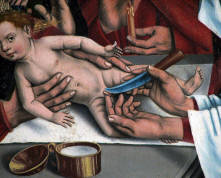
One of the benefits about writing on a topic like the spirituality of travel or relics is that long after the article appears people keep sending you material. Fortunately, I’m still very interested in the subject matter. (I’m sad to say that’s not always true of subjects I’ve written about. After finishing my book on Christianity and the Celts I took a long break from reading anything even slightly related to Celtic Christianity. I’m over it now and even read Jon Sweeney’s edited version of J.B. Bury’s Patrick biography.)
So now I have three new books at the top of my summer reading pile.
The first is Tamara Park’s Sacred Encounters, which came out in January from InterVarsity Press. Her travelogue from Rome to Jerusalem is the latest of several evangelical pilgrimage books. I must confess I don’t yet know much more about it than that, but I’m glad to see Christian publishers continue to move into this area.
The second is Rag and Bone, Peter Manseau’s more journalistic pilgrimage to holy relics from various religions. The excerpts I’ve read are fascinating. I’m not very interested in multifaith books that seek to derive meaning by looking for what Muslims, Buddhists, Christians, and Sikhs all do similarly (my “spirituality and travel” bookshelf has far too many of such titles), but I’ve enjoyed Manseau’s writing elsewhere.
The third is more specific and (ahem) less serious. In An Irreverent Curiosity, David Farley goes in search one particular relic. The strangest relic of all, perhaps: Jesus’ foreskin. Based on a snickering 2006 preview of sorts he wrote for Slate, I don’t think this is a book Christianity Today will be recommending highly, even though Protestants have been very negative on relics in general and on Jesus-related relics in particular.
But since my last blog post on relics, the most interesting related item I’ve read was a report in Archeology. UCLA anthropologist Charles Stanish, who is director of the Cotsen Institute of Archaeology, argued that eBay is hurting antiquities looters and saving real antiquities. (The piece originally appeared in the Cotsen Institute’s Backdirt.)
“Our greatest fear was that the Internet would democratize antiquities trafficking and lead to widespread looting,” he wrote. Instead:
many of the primary “producers” of the objects have shifted from looting sites to faking antiquities. … We can only hope, but it is just conceivable that online commerce will actually put a lot of antiquities looters and traffickers out of business by the sheer volume of sales and quality of products that fool even the experts. … . I suppose if people stopped believing that they can buy a pill that will help them lose weight without dieting or exercise, then it is possible that people will stop buying fakes online, and we will return to old-fashioned looting. We just have to wait and see what surprises the Internet brings us in the future.
I don’t know if the same economics would hold true for Christian relics, of which eBay has many for sale (much to the consternation of many believers and others). Looting of relics might have been common a millennium ago, but seems pretty rare today.
But as Farley’s foreskin book illustrates, it still happens on occasion. And those of us who remember the James ossuary controversy (there’s a new book on that, too, which I’ll be skipping) might be interested to note that the forgery trial has been at a standstill since late March. I wonder: Is it worse if the James ossuary is a fake, or if it is real, looted, and irrevocably removed from its original location?
Image: Public domain via Wikimedia commons: Circoncision sur le retable des Douze Apôtres de Friedrich Herlin de Nördlingen, 1466.Rothenburg ob der Tauber








